Taking antibiotics can disrupt the balance of good bacteria in your gut. This may lead to digestive issues and other health problems. Luckily, there are ways to help your gut recover after antibiotic treatment.

Eating fiber-rich foods, taking probiotics, and making certain lifestyle changes can help restore gut health after antibiotics. These steps support the regrowth of beneficial bacteria in your digestive system. It’s important to start the recovery process as soon as possible after finishing your antibiotic course.
Restoring gut health takes time and effort, but the benefits are worth it. A healthy gut plays a key role in overall wellness, affecting everything from digestion to immune function. By following some simple strategies, you can help your gut microbiome get back on track.
Key Takeaways
- Fiber-rich foods help feed good gut bacteria after antibiotic use
- Probiotic supplements can replenish beneficial bacteria in the gut
- Lifestyle factors like stress management support gut health recovery
Understanding Antibiotics and Gut Health
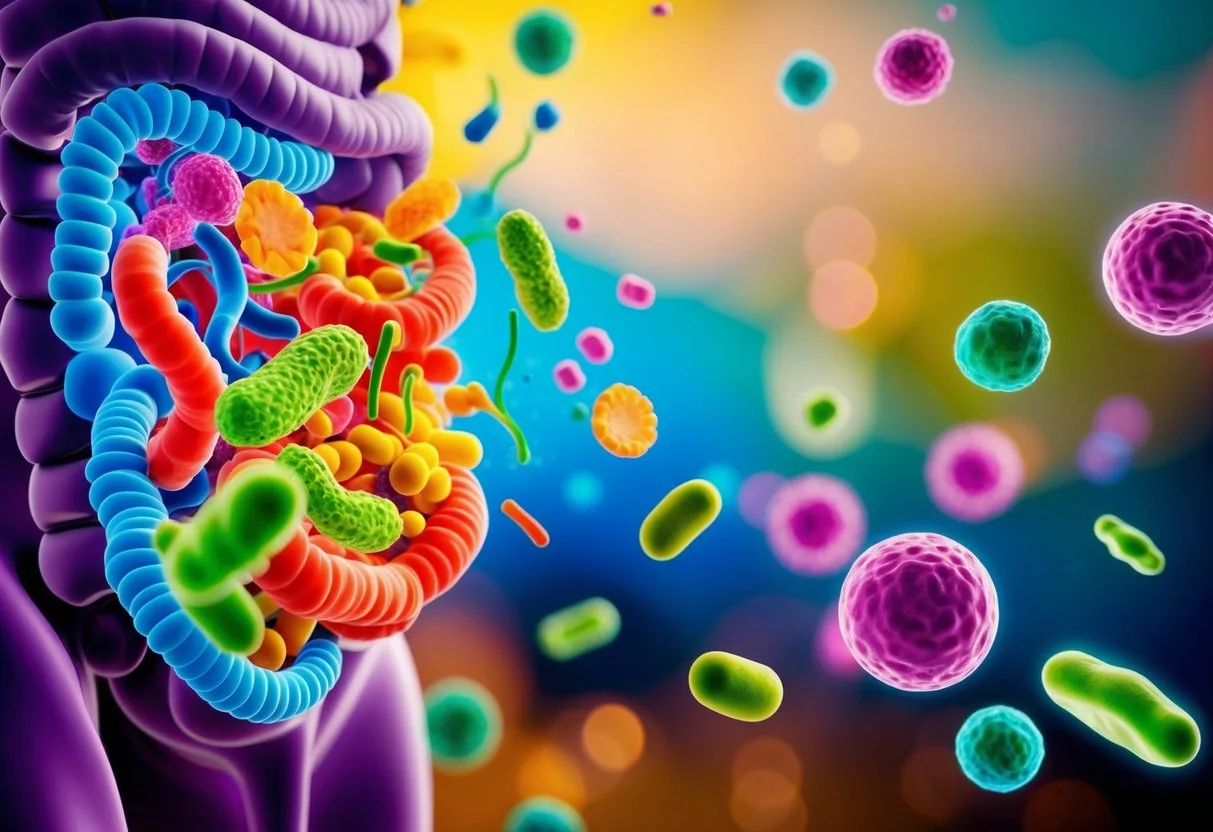
Antibiotics affect the balance of bacteria in the gut. This can lead to changes in gut health and function. Let’s look at how antibiotics impact the gut microbiome and what risks this may pose.
Impact of Antibiotics on the Gut Microbiome
Antibiotics kill bacteria, both good and bad. They can wipe out beneficial bacteria in the gut. This changes the gut microbiota makeup.
Broad-spectrum antibiotics have a larger impact. They target many types of bacteria. This can lead to a big drop in gut bacteria diversity.
Some effects of antibiotics on gut microbiota:
- Reduced number of good bacteria
- Increase in harmful bacteria
- Changes in bacterial species present
- Altered gut function
These changes can last for weeks or months after stopping antibiotics.
The Concept of Dysbiosis
Dysbiosis is an imbalance in gut bacteria. It happens when there are too many bad bacteria or not enough good ones.
Antibiotics can cause dysbiosis by:
- Killing off good bacteria
- Allowing harmful bacteria to grow
- Changing the types of bacteria present
Signs of dysbiosis may include:
- Digestive issues
- Bloating
- Changes in bowel habits
Dysbiosis can affect overall health. It may lead to immune system problems or other health issues.
Risks of Antibiotic Overuse
Using antibiotics too often can harm gut health. It may lead to long-term changes in gut bacteria.
Risks of overusing antibiotics include:
- Antibiotic resistance
- Chronic digestive problems
- Weakened immune system
- Increased risk of infections
Antibiotic overuse can also make it harder for the gut to recover. This may lead to ongoing health issues.
To reduce risks, antibiotics should only be used when needed. Doctors should prescribe the right type and dose for each situation.
The Role of Diet in Gut Health Recovery
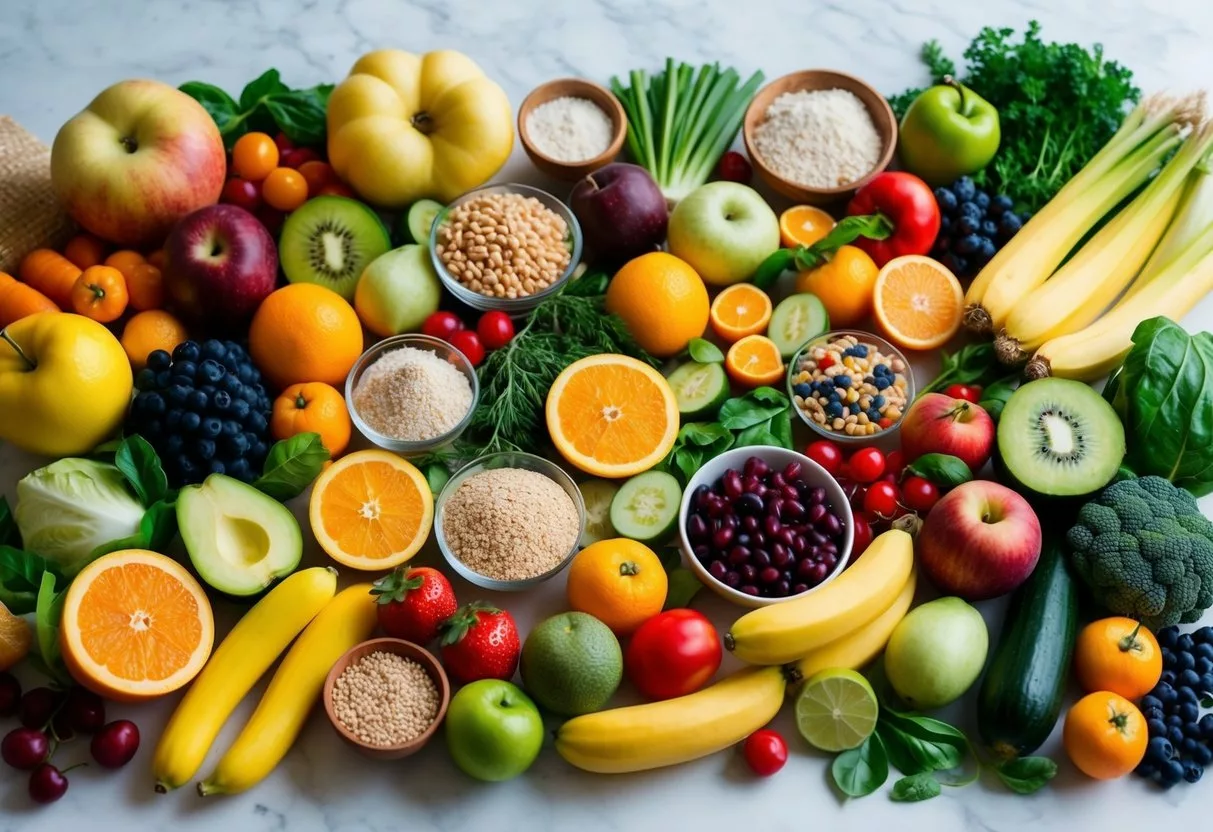
Diet plays a key part in restoring gut health after antibiotics. Eating the right foods can help replenish good bacteria and support digestive balance.
Fiber-Rich Foods and Their Benefits
Eating a diet rich in fiber is crucial for gut recovery. Fiber feeds beneficial gut bacteria and promotes regular bowel movements.
Good sources of fiber include:
• Whole grains
• Legumes
• Fruits
• Vegetables
Apples, bananas, and berries are especially good choices. They contain both fiber and prebiotics.
Aim for at least 25-30 grams of fiber per day. Increase intake slowly to avoid digestive discomfort.
Probiotic and Prebiotic Foods
Probiotic foods contain live beneficial bacteria. Prebiotic foods feed those good bacteria.
Probiotic-rich foods:
• Yogurt
• Kefir
• Sauerkraut
• Kimchi
Prebiotic-rich foods:
• Garlic
• Onions
• Asparagus
• Leeks
• Artichokes
Eat a mix of both types daily. This helps restore and maintain a healthy gut microbiome.
Foods to Avoid During Recovery
Some foods can hinder gut healing after antibiotics. It’s best to limit or avoid:
• Processed foods
• Added sugars
• Artificial sweeteners
• Alcohol
These can feed harmful bacteria or irritate the gut lining.
Instead, focus on whole, unprocessed foods. Choose lean proteins, healthy fats, and plenty of fruits and vegetables.
Stay hydrated by drinking plenty of water. This helps flush out toxins and supports digestive health.
Probiotics and Their Effect on Gut Health
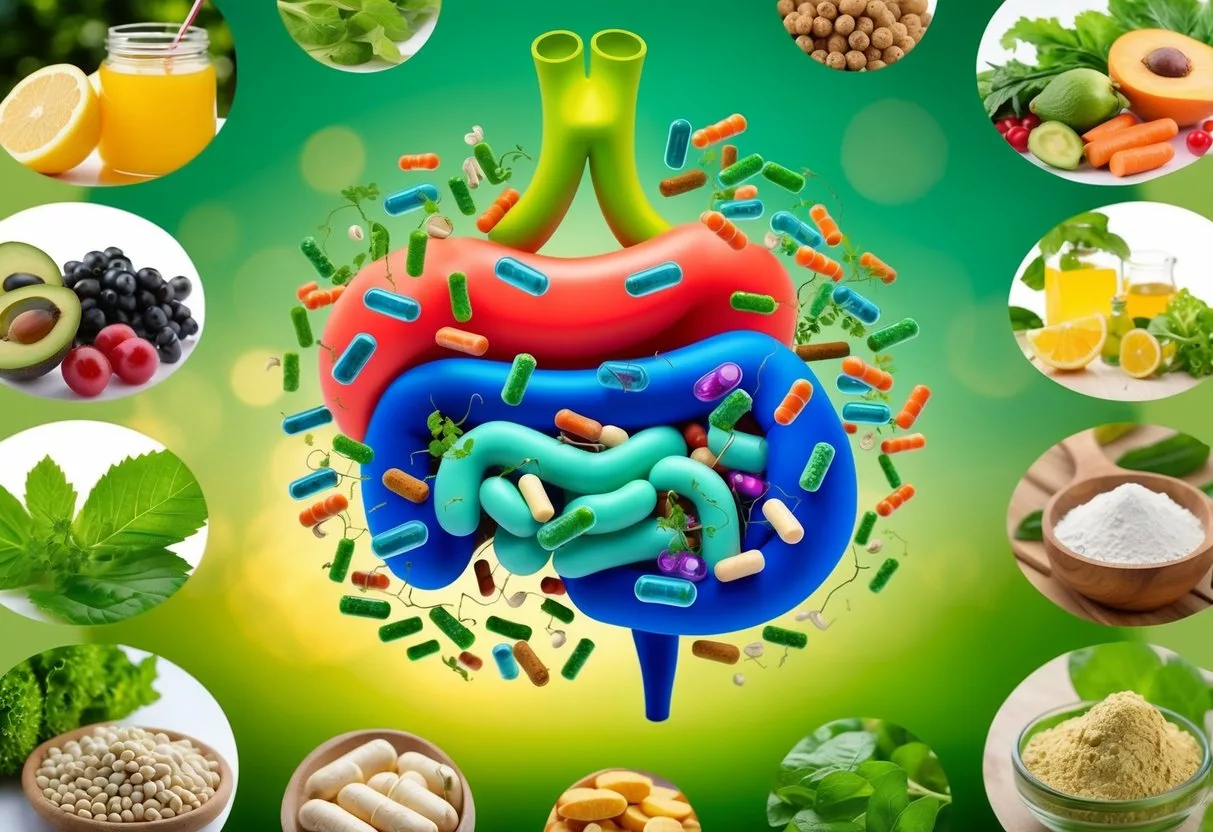
Probiotics are living microorganisms that can help restore balance to the gut after antibiotic use. These beneficial bacteria support digestive health and boost the immune system.
Introducing Beneficial Bacteria with Probiotics
Probiotics contain good bacteria like Lactobacillus and Bifidobacteria. These microbes help replenish the gut flora disrupted by antibiotics. Probiotic supplements often include strains such as L. acidophilus and B. bifidum.
Some probiotic foods naturally contain helpful bacteria. Yogurt, kefir, and fermented vegetables are good sources. These foods introduce live cultures to the digestive system.
Saccharomyces boulardii is a beneficial yeast that can also support gut health. It’s often used to prevent antibiotic-associated diarrhea.
Synbiotics combine probiotics with prebiotics. Prebiotics are fibers that feed good bacteria. This combination may be more effective than probiotics alone.
Choosing the Right Probiotics
When selecting a probiotic, look for products with multiple strains of bacteria. A diverse mix of microbes is often more beneficial than a single strain.
Check the colony-forming units (CFUs) on the label. Higher numbers usually indicate more potent products. Aim for at least 1 billion CFUs per dose.
Consider the specific strains included. Different bacteria have different effects. For example, L. rhamnosus GG is well-studied for preventing antibiotic-associated diarrhea.
Timing matters when taking probiotics. It’s best to take them a few hours apart from antibiotics. This helps ensure the beneficial bacteria aren’t killed by the medication.
Prebiotics and Gut Health Enhancement
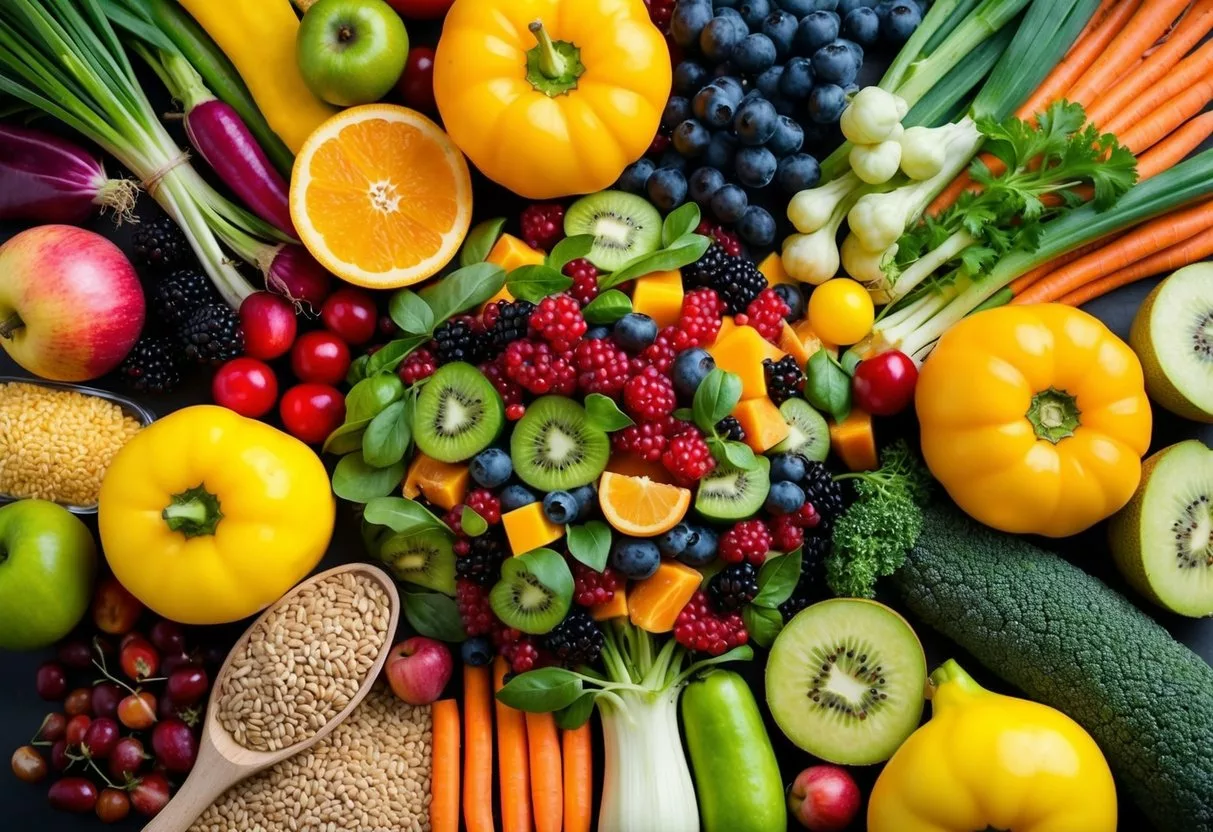
Prebiotics play a key role in restoring gut health after antibiotics. These special fibers feed beneficial bacteria and promote a balanced microbiome.
Fueling Healthy Bacteria with Prebiotics
Prebiotics are types of dietary fiber that nourish good gut bacteria. They pass through the digestive system undigested until they reach the colon. There, gut bacteria ferment these fibers.
This fermentation produces short-chain fatty acids (SCFAs). SCFAs help:
- Reduce inflammation
- Strengthen the gut lining
- Support immune function
Common prebiotic foods include:
- Garlic
- Onions
- Leeks
- Asparagus
- Bananas
- Oats
Eating a variety of these foods supports diverse gut flora. This diversity is crucial for overall gut health and function.
Prebiotic Supplements vs. Foods
While whole foods are ideal, prebiotic supplements can also be beneficial. These supplements often contain specific types of fiber like inulin or fructooligosaccharides (FOS).
Supplements may be helpful for those who:
- Have difficulty eating enough prebiotic foods
- Need targeted gut support
However, whole foods offer additional benefits:
- They contain a mix of fibers and nutrients
- They’re more cost-effective
- They support overall health beyond just gut function
For most people, a diet rich in prebiotic foods is sufficient. Supplements can be used as a complement to a healthy diet, not a replacement.
Lifestyle Factors Influencing Gut Health Recovery

Daily habits play a big role in helping your gut heal after taking antibiotics. Exercise, sleep, stress levels, and how much water you drink all affect your gut health.
Exercise’s Role in Maintaining Gut Health
Regular exercise helps keep your gut healthy. It improves the mix of good bacteria in your gut. Physical activity boosts your immune system and aids digestion.
Aim for 30 minutes of exercise most days. This can include walking, swimming, or biking. Even light exercise like yoga can help.
Exercise also reduces stress. This is good for your gut because stress can harm gut bacteria. Try to find activities you enjoy to make it easier to stick with them.
The Importance of Sleep and Stress Reduction
Getting enough sleep is key for gut health. Good sleep allows your body to repair and restore. Aim for 7-9 hours of sleep each night.
Create a good sleep routine. Go to bed and wake up at the same times each day. Keep your bedroom dark and cool. Avoid screens before bed.
Reducing stress also helps your gut. Too much stress can harm gut bacteria. Try relaxation methods like deep breathing or meditation. Take time each day to do things you enjoy.
Hydration and Gut Function
Drinking enough water is vital for gut health. Water helps move food through your digestive system. It also helps good bacteria grow in your gut.
Aim to drink 8 glasses of water a day. You may need more if you exercise or it’s hot out. Herbal teas and water-rich foods like fruits also count.
Avoid drinks with lots of sugar. These can feed bad gut bacteria. If you don’t like plain water, try adding lemon or cucumber slices for flavor.
Avoiding and Treating Complications
Taking antibiotics can lead to gut health issues. Some problems may arise during or after treatment. Knowing how to handle these issues can help protect your digestive system.
Dealing with Antibiotic-Associated Diarrhea
Antibiotic-associated diarrhea is a common side effect of antibiotic use. It happens when antibiotics disrupt the normal gut bacteria balance. To manage this:
- Stay hydrated by drinking plenty of water
- Eat foods rich in probiotics like yogurt or kefir
- Consider taking a probiotic supplement
If diarrhea is severe or lasts more than a few days, it’s important to see a doctor. In some cases, it could be a sign of a C. difficile infection, which needs medical treatment.
Managing Chronic Gastrointestinal Issues
Some people may face ongoing gut problems after antibiotics. These can include:
- Chronic diarrhea
- Constipation
- Bloating
- Abdominal pain
To address these issues:
- Follow a balanced diet with plenty of fiber
- Take probiotics regularly
- Stay active with regular exercise
- Manage stress through relaxation techniques
If symptoms persist, it’s crucial to consult a healthcare provider. They can rule out other conditions and suggest targeted treatments.
Preventing Recurring Infections
Antibiotics can weaken the immune system, making repeat infections more likely. To reduce this risk:
- Boost immune function through a healthy diet
- Get enough sleep each night
- Wash hands often to avoid germs
- Avoid unnecessary antibiotic use
For those prone to recurring infections, doctors may suggest probiotics or other preventive measures. It’s important to follow medical advice and complete all prescribed antibiotic courses to prevent antibiotic resistance.
Monitoring and Maintaining Long-Term Gut Health
Keeping your gut healthy over time requires regular check-ups and smart lifestyle choices. These steps help protect your microbiome and boost your overall health.
Regular Check-ups and Microbiota Testing
Routine health exams play a key role in tracking gut health. Doctors may suggest stool tests to check your gut microbiome. These tests can spot harmful bacteria or a lack of good bacteria.
Blood tests also give clues about nutrient absorption and gut function. If issues come up, your doctor can suggest fixes early on.
Some clinics now offer detailed microbiome tests. These map out the types and amounts of bacteria in your gut. The results can guide personalized diet and supplement plans.
Sustainable Gut Health Through Diet and Lifestyle
A balanced diet rich in fiber feeds good gut bacteria. Aim for lots of fruits, veggies, and whole grains. Prebiotic foods like garlic, onions, and bananas help too.
Fermented foods add beneficial bacteria to your gut. Try yogurt, kefir, sauerkraut, or kimchi.
Regular exercise boosts gut health. Even a daily walk can make a difference.
Manage stress through methods like meditation or yoga. High stress can harm gut bacteria.
Limit antibiotic use when possible. If needed, take them exactly as prescribed.
Get enough sleep. Poor sleep can disrupt the gut microbiome.
Stay hydrated. Water helps move food through your system and supports digestive health.
Special Considerations for Specific Conditions
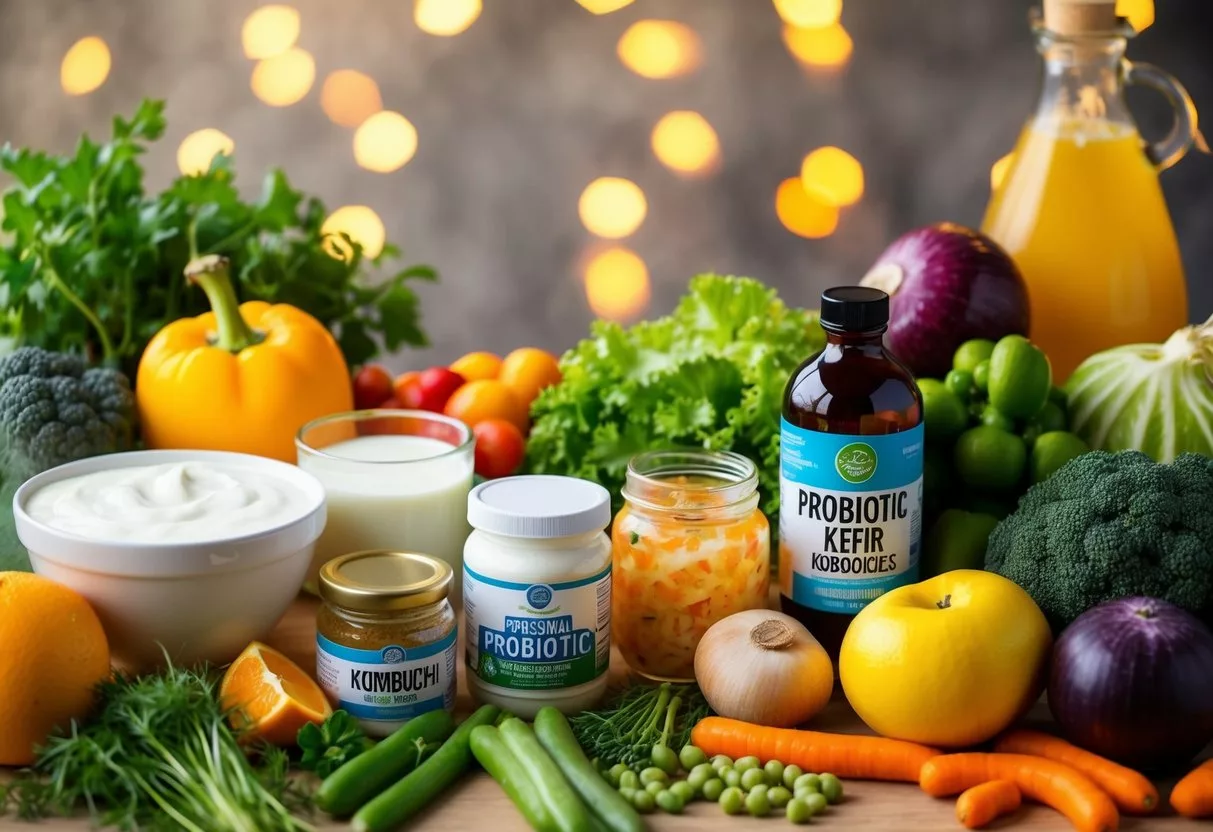
Some health conditions require extra care when restoring gut health after antibiotics. Different approaches may be needed for autoimmune disorders, inflammatory bowel diseases, and respiratory infections.
Implications for Autoimmune Disorders and IBD
People with Crohn’s disease or inflammatory bowel disease (IBD) need to be extra careful when rebuilding gut health. These conditions can make the gut more sensitive to changes.
For IBD patients, a diet rich in fiber may help restore good bacteria. But it’s important to start slowly and watch for any bad reactions.
Probiotic supplements might be helpful, but patients should talk to their doctor first. Some probiotics could make symptoms worse in certain cases.
Crohn’s disease patients may need to avoid certain foods while rebuilding gut health. Common triggers include dairy, high-fat foods, and spicy dishes.
Addressing Gut Health in Respiratory Infections
Respiratory infections like pneumonia, asthma, and sinus infections can affect gut health in unexpected ways. Antibiotics used to treat these conditions can disrupt the gut microbiome.
For people with asthma, maintaining a healthy gut may help reduce inflammation in the lungs. Eating fermented foods and taking probiotics could be beneficial.
Sinus infection patients might benefit from nasal probiotics in addition to gut-friendly foods. This can help restore balance in both the sinuses and the gut.
After pneumonia treatment, focusing on prebiotic foods can help good bacteria grow back. Foods like garlic, onions, and bananas are good choices.
Frequently Asked Questions
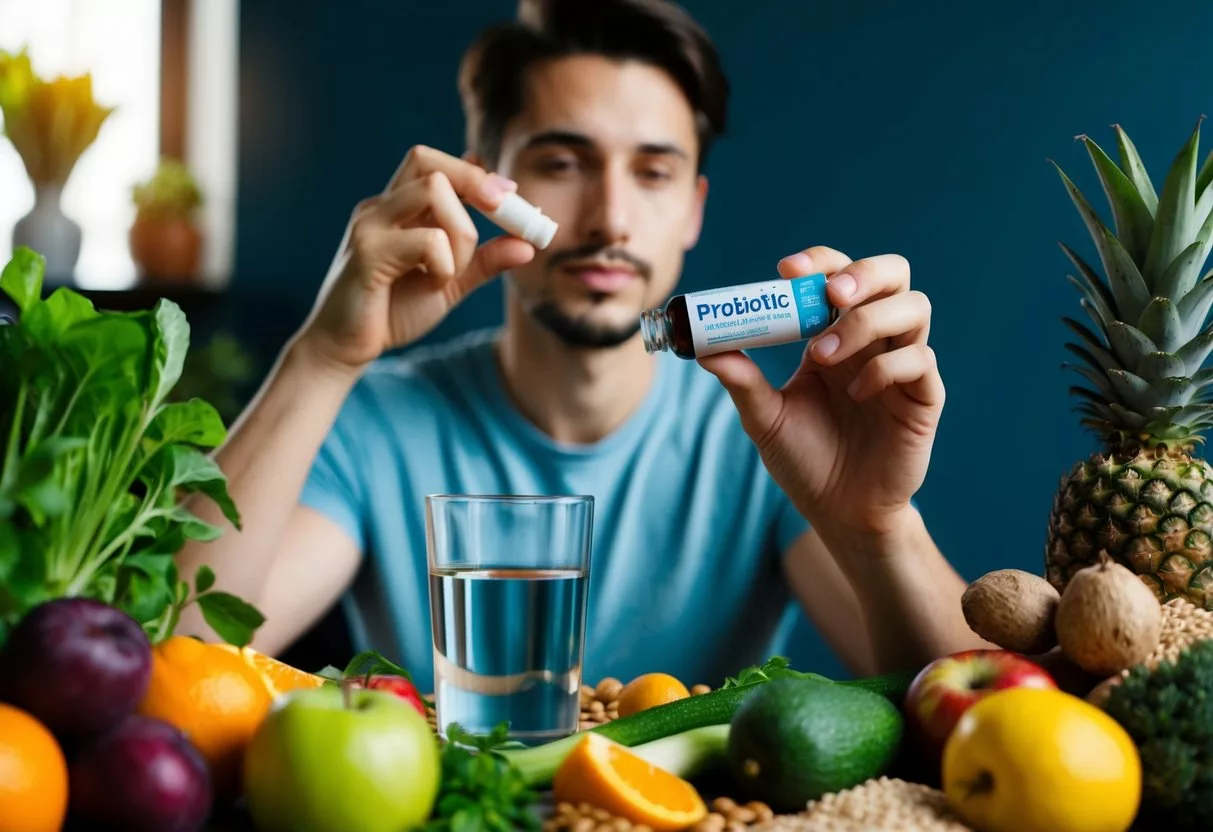
Restoring gut health after antibiotic use involves specific dietary choices, probiotic supplementation, and addressing potential issues. The recovery process can take time and may require avoiding certain foods.
What are effective dietary strategies to heal the gut after antibiotic use?
Eating a diet rich in fiber is key to restoring gut health after antibiotics. Focus on prebiotic soluble fermentable fibers from fruits, vegetables, and complex carbohydrates. These fibers feed the good bacteria in your gut.
Include fermented foods like yogurt, kefir, and sauerkraut. They contain beneficial bacteria that can help repopulate the gut microbiome.
Which probiotics are recommended for restoring gut health following antibiotic treatment?
Probiotics containing Lactobacillus and Bifidobacterium strains are often recommended. These bacteria are common inhabitants of a healthy gut.
Look for probiotic supplements with multiple strains and high colony-forming unit (CFU) counts. Consult a healthcare provider for personalized recommendations.
What is leaky gut syndrome and can it be caused by antibiotics?
Leaky gut syndrome is a condition where the intestinal lining becomes more permeable. This allows substances to pass into the bloodstream that normally wouldn’t.
Antibiotics can disrupt the gut microbiome balance. This disruption may contribute to increased intestinal permeability in some cases.
How can long-term stomach issues post-antibiotics be addressed?
Eating a wholesome diet, exercising regularly, and managing stress can help address long-term stomach issues after antibiotics. These strategies support overall gut health.
Consider working with a gastroenterologist. They can provide targeted treatments for persistent digestive problems.
What is the typical recovery time for the immune system after a course of antibiotics?
The immune system’s recovery time can vary. It may take several weeks to months for the gut microbiome to fully rebalance.
Factors like diet, stress levels, and overall health influence recovery time. Consistent healthy habits support faster immune system restoration.
Are there specific foods to avoid when trying to restore gut health after antibiotics?
Limit processed foods, added sugars, and artificial sweeteners. These can feed harmful bacteria and slow down gut healing.
Reduce alcohol consumption. Alcohol can irritate the gut lining and disrupt the balance of gut bacteria.